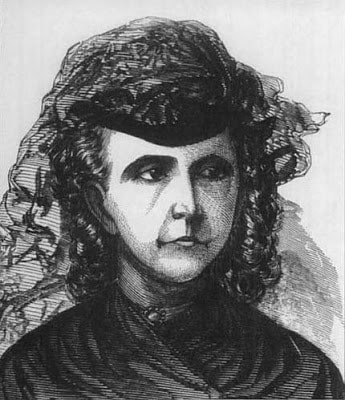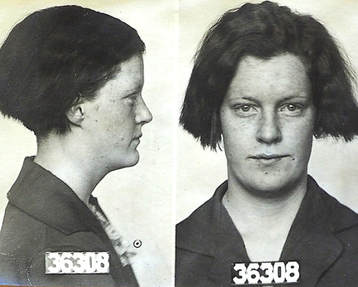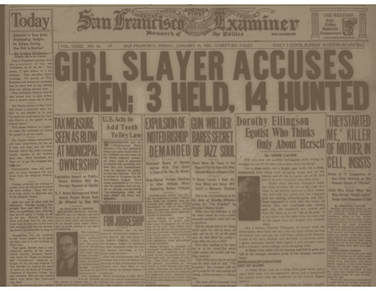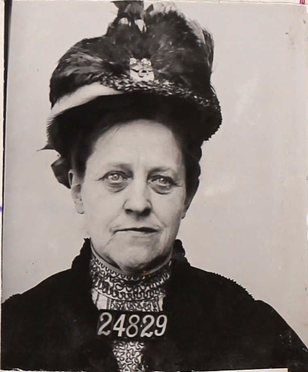Picture a boat approaching the Ferry Building on a warm night in November 1870. A well- dressed man is seated on the deck talking lovingly to his wife. All of a sudden, a beautiful woman, dressed in black and wearing a veil approaches. The man stands up. The woman pulls out a gun and shoots him in the heart. “I killed him”, she said. “He ruined my life and my daughters.”
The woman was Laura Fair. And if there was a theme to her life it was bad taste in men
Laura was first married in New Orleans at the age of 16. Her first husband drank himself to death, her second husband threatened to shoot her. Laura and her mother fled to San Francisco where she met her third husband, an attorney. They had a baby girl together but his practice was not successful. Two years later, heavily in debt, he committed suicide.
She sold her husband’s law books and purchased a boarding house in Virginia City, a prosperous silver town. Her good looks and charm soon made her a celebrated hostess and her place, The Comstock House, flourished. Everything was going well. Then she met Alexander Crittenden. Alexander was a successful attorney and politician who came to stay at Laura’s boardinghouse. Before long they were lovers. Laura asked him to marry her and he agreed, telling her that he was a widower. Then Laura learned that he had lied and that his wife Clara and their children were coming to visit him. Alexander used his considerable rhetorical skills to assure Laura that he would soon get a divorce and marry her. He installed his family in a residence located close to Laura’s boarding house and shuttled between his mistress and his wife deceiving both of them. He told Laura that he would stay in a rooming house during his wife’s visit and he told his wife that his room in the Comstock House was used only for business.
For the next five years he stalled and lied, creating imaginary barriers to divorce so that he could continue his passionate affair with Laura. He flaunted the affair, installing both Laura and his family in San Francisco’s Occidental Hotel, telling his wife that Laura was just an old friend who he was helping out. Finally Laura gave him an ultimatum. “Divorce your wife or we are through.”
Alexander promised to meet his wife, who was returning from a trip to the East Coast, at the ferry and tell her it was all over between them. Laura bought a pistol and secretly followed him aboard. She realized that he had lied to her once more. And that’s where our story began. Crittenden’s funeral was majestic and all federal, state, and city courts were closed in his honor.
Laura’s trial was the most sensational San Francisco had ever seen. It was headline news, not just in San Francisco, but also all over the country. It had everything; politics, murder, scandal, sex and feminism. Suffragette leaders Susan B Anthony and Elizabeth Cady Stanton attended the trial and pointed out the double standard that excused men but vilified women for sexual relations.
The most sensational evidence were the letters that Laura and Alexander sent to each other. Crittenden’s letters were described by the San Francisco Chronicle as a “rich feast of gushing sentimentality.” “My love for you has been and is the one passion of my life. It is my whole life and will never cease but with death.”
Laura’s letters were more erotic.” You shall kiss me in every corner of the room, hold me in your arms in each chair, lie by me on the sofa, hang over me at the piano, and sleep with me in the bed.” The prosecutor called her a “bold, bad, vicious, malignant passionate woman” who had seduced an otherwise honorable man.
There was no question that Laura had shot Alexander Crittenden. But would a jury of men convict her of first-degree murder? The answer was yes. After only 40 minutes of deliberation the jury came back with a guilty verdict and she was sentenced to death. Immediately, public opinion then changed from outrage to sympathy. First her lawyers won a stay of execution and then a new trial. This time, the jury found the defendant not guilty, by reason of temporary insanity.
San Francisco papers called the verdict “an outrage on humanity.” The New York World opined “How many men this wretched woman has beguiled into breaking their vows and wrecking their manhood with her gross seductions we cannot know.”
After the trial Laura was shunned by polite society in San Francisco. She stayed in the news for a while, lecturing on the stage and having legal battles with her doctor, lawyer and mother. Soon she faded into the background, until another tragic death occurred. Her daughter Lillian grew up to be a gorgeous woman and was selected “The California Venus” in California’s first beauty contest. Lillian moved to New York to become an actress and died there of starvation in a tiny furnished room in 1913. Upon hearing this news Laura tried to commit suicide but failed. Laura died in a small Market Street apartment in 1920 at the age of 82.
The woman was Laura Fair. And if there was a theme to her life it was bad taste in men
Laura was first married in New Orleans at the age of 16. Her first husband drank himself to death, her second husband threatened to shoot her. Laura and her mother fled to San Francisco where she met her third husband, an attorney. They had a baby girl together but his practice was not successful. Two years later, heavily in debt, he committed suicide.
She sold her husband’s law books and purchased a boarding house in Virginia City, a prosperous silver town. Her good looks and charm soon made her a celebrated hostess and her place, The Comstock House, flourished. Everything was going well. Then she met Alexander Crittenden. Alexander was a successful attorney and politician who came to stay at Laura’s boardinghouse. Before long they were lovers. Laura asked him to marry her and he agreed, telling her that he was a widower. Then Laura learned that he had lied and that his wife Clara and their children were coming to visit him. Alexander used his considerable rhetorical skills to assure Laura that he would soon get a divorce and marry her. He installed his family in a residence located close to Laura’s boarding house and shuttled between his mistress and his wife deceiving both of them. He told Laura that he would stay in a rooming house during his wife’s visit and he told his wife that his room in the Comstock House was used only for business.
For the next five years he stalled and lied, creating imaginary barriers to divorce so that he could continue his passionate affair with Laura. He flaunted the affair, installing both Laura and his family in San Francisco’s Occidental Hotel, telling his wife that Laura was just an old friend who he was helping out. Finally Laura gave him an ultimatum. “Divorce your wife or we are through.”
Alexander promised to meet his wife, who was returning from a trip to the East Coast, at the ferry and tell her it was all over between them. Laura bought a pistol and secretly followed him aboard. She realized that he had lied to her once more. And that’s where our story began. Crittenden’s funeral was majestic and all federal, state, and city courts were closed in his honor.
Laura’s trial was the most sensational San Francisco had ever seen. It was headline news, not just in San Francisco, but also all over the country. It had everything; politics, murder, scandal, sex and feminism. Suffragette leaders Susan B Anthony and Elizabeth Cady Stanton attended the trial and pointed out the double standard that excused men but vilified women for sexual relations.
The most sensational evidence were the letters that Laura and Alexander sent to each other. Crittenden’s letters were described by the San Francisco Chronicle as a “rich feast of gushing sentimentality.” “My love for you has been and is the one passion of my life. It is my whole life and will never cease but with death.”
Laura’s letters were more erotic.” You shall kiss me in every corner of the room, hold me in your arms in each chair, lie by me on the sofa, hang over me at the piano, and sleep with me in the bed.” The prosecutor called her a “bold, bad, vicious, malignant passionate woman” who had seduced an otherwise honorable man.
There was no question that Laura had shot Alexander Crittenden. But would a jury of men convict her of first-degree murder? The answer was yes. After only 40 minutes of deliberation the jury came back with a guilty verdict and she was sentenced to death. Immediately, public opinion then changed from outrage to sympathy. First her lawyers won a stay of execution and then a new trial. This time, the jury found the defendant not guilty, by reason of temporary insanity.
San Francisco papers called the verdict “an outrage on humanity.” The New York World opined “How many men this wretched woman has beguiled into breaking their vows and wrecking their manhood with her gross seductions we cannot know.”
After the trial Laura was shunned by polite society in San Francisco. She stayed in the news for a while, lecturing on the stage and having legal battles with her doctor, lawyer and mother. Soon she faded into the background, until another tragic death occurred. Her daughter Lillian grew up to be a gorgeous woman and was selected “The California Venus” in California’s first beauty contest. Lillian moved to New York to become an actress and died there of starvation in a tiny furnished room in 1913. Upon hearing this news Laura tried to commit suicide but failed. Laura died in a small Market Street apartment in 1920 at the age of 82.




 RSS Feed
RSS Feed